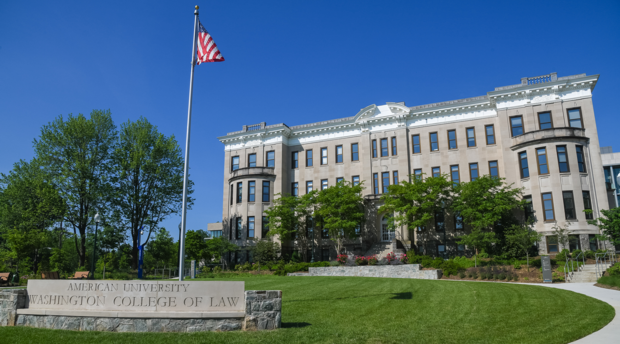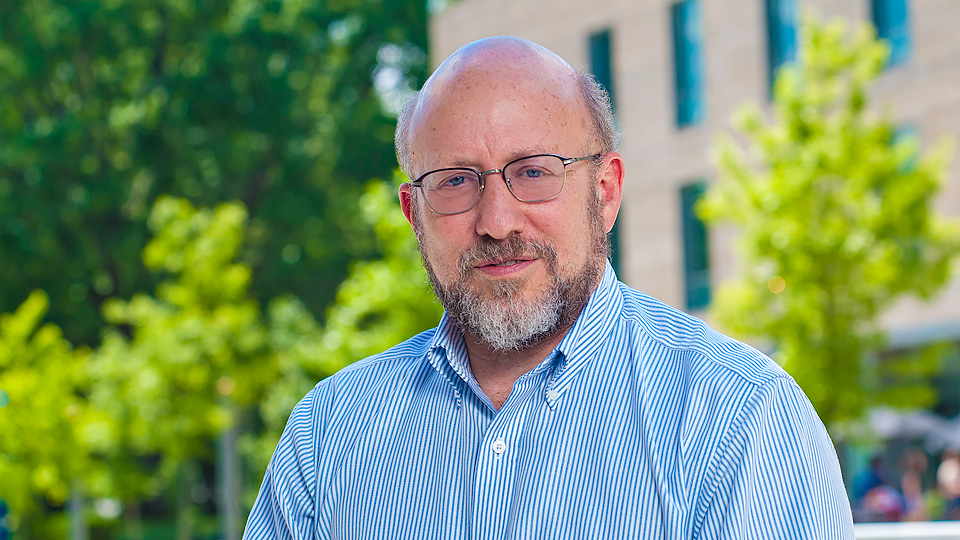Disability Rights Law Clinic at 15: Serving a Community in Need
Dean Dinerstein, Clinic Students and Alumni Reflect on the Work of the DRLC
Nov. 4, 2020
For Marissa Ditkowsky ’19, navigating many spaces—employment, academics, entertainment—is difficult. As a disabled person with myotonic dystrophy, she has fought for accommodations, and dealt with inappropriate and discriminatory comments. It was this fight – not only for herself, but for all of those with disabilities – that led her to American University Washington College of Law.

“The existence of the Disability Rights Law Clinic was one of the reasons I decided to attend Washington College of Law,” said Ditkowsky, who is currently the Gallogly Family Foundation Fellow at Tzedek DC, a legal service non-profit dedicated to safeguarding the rights of DC residents with low incomes. “I knew that it would provide me with the skills, tools, and experience I needed to represent disabled clients, understand relevant statutes and regulations, and get a taste for how some of these cases work in practice.”
The Disability Rights Law Clinic (DRLC) was founded by Professor and Acting Dean Robert Dinerstein in 2005. Though his work in AUWCL’s nationally-ranked Clinic Program began within the Criminal Justice Clinic, Dinerstein noticed how often these criminal clinic cases raised disability issues. Creating a clinic where student attorneys could work on representing clients with disabilities, who so often do not have quality representation, would benefit both the client and student, he said.
“In the disability work I've done over the years, I often was frustrated by what seemed like inadequate and less-than-zealous lawyering. A disability rights clinic would allow us to train students to have some experience and exposure to these issues prior to graduating from law school,” Dinerstein said. “I also thought that the issues were very legally complex, so in addition to working with a different, important group of clients, the clinic would provide what all our clinics do, which is really good training and how to be a great lawyer.”
Like Ditkowsky, Kelly Israel’s desire to attend law school centered on her own experience as a disabled person. Israel ’15, who is autistic, said growing up attending special education classes and experiencing first-hand unequal treatment in academic spaces led her to “use the mechanisms of statute and regulation to change what I had experienced, to create a world in which children with disabilities weren't made to feel as if they were nothing.” Dinerstein, she said, was another key reason she joined the Clinic.
“Bob Dinerstein acted as a major legal mentor for me during my days in law school,” Israel l said. “He had an encyclopedic knowledge of international law that I took a lot of advantage of, and consequently learned details about guardianship and the Convention on the Rights of People with Disabilities that would serve me well later on. I took his Disability Law seminar solely because he was teaching it, and consequently joined the DRLC because he was mentoring it. I really respect him a great deal.”
A Community-Focused Clinic
Perhaps Dinerstein’s biggest motivation for founding DRLC, however, was the community need for representation in both disability rights and special education cases. Local law school clinics, with one specialized exception, did not handle these cases. Nationally, although some law schools had disability law clinics, Dinerstein said many of these focused on disability benefits – important and meaningful work, he said, but a “niche and a need” was still left to fill.
“I had seen so many examples where people with disabilities were being portrayed, both in law and in the media, in what I would call the ‘defect model’ – something is wrong with you – and to win benefits cases you really have to emphasize that, to show all the ways in which you're so substantially limited that you can't work,” Dinerstein said. “I wanted to be arguing cases more positively, and more in connection with the autonomy that these clients deserve. There are really only a handful of disability rights clinics that have that focus and the range of cases that we have.”
This focus on rights- and autonomy-based work led DRLC to take on many special education cases within the District, which Dinerstein said provides student attorneys with an opportunity for advocacy not just within a hearing or trial, but at Individual Education Program (IEP) meetings.

Prior to attending AUWCL, 3L Ana Saragoza was a teacher and said that 25% of her students had IEPs. After learning that the DRLC represents students receiving special education she joined the clinic, merging her teaching experience with the skills learned throughout law school. Upon graduation, Saragoza is set to clerk for a family law judge in the D.C. Superior Court, where many litigants appear pro se.
“Recently, my partner and I represented our client in an IEP meeting, and I was able to use my teaching background to understand our client's son's IEP. One of the assessments the school uses is an assessment I used to administer myself as a teacher,” Saragoza said. “I could see where my client's son needed additional support and services and used that information to advocate on our client's behalf.”
Ditkowsky notes her work as a DRLC student-attorney with Every Student, Every Day Coalition – a group of organizations promoting access to education – as her most memorable in the Clinic.
“We advocated on a number of issues, including the passage of the Student Fair Access to School Act of 2017. The Act significantly limited the ways in which D.C. Public Schools could expel and suspend students, an issue that disproportionately affects students with disabilities and students of color,” she said. “The Act provided additional protections for students with disabilities. I had the opportunity to submit testimony to the D.C. Council about how this legislation would be beneficial, including to some of our own clients.”
Other cases handled by the DRLC over the years have dealt with the Americans with Disabilities Act (ADA), civil commitment cases, and cases dealing with supported decision making, an alternative to guardianship. The Clinic has also done non-litigation work, teaming up with external partners, including in the Obama administration’s State Department, to work on background materials presented in support of ratification of the UN Convention on the Rights of Persons with Disabilities (which the Senate narrowly defeated).
Moving Forward
On Oct. 27, Dinerstein spoke at “ADA30: Looking Back, Moving Forward,” a virtual event celebrating the 30th anniversary of the ADA, presented by the Program on Law and Government and Verizon.
WATCH: ADA30 - Looking Back, Moving Forward
One of the things that has changed most over the last three decades is the recognized intersectionality between disability and race, gender, sexual orientation, and trans status, Dinerstein said. Younger disability advocates consider the rights delivered by the ADA as given, and are taking a critical look at what else needs to be done to move disability rights forward.
“There’s a lot more complexity to who we are talking about when we talk about people with disabilities,” he said. “And there are more people who are attorneys who have disabilities, and a greater embracing on the part of lawyers who disclose that. That has helped to reduce, although not eliminate, the stigma that still is associated with disability, particularly mental disabilities.”
Israel currently works as a policy analyst for Autistic Self Advocacy Network (ASAN), which promotes the self-determination and involvement of all autistic people. She serves as the second member and co-counsel for ASAN's Legal and Public Policy Team, and acts “as a co-counsel of sorts for ASAN itself” to examine any contract, rule, or regulation that impacts 501(c)(3)s generally.
Oppression against disabled people is usually an afterthought, which is why having a clinic like DRLC dedicated to protecting and advancing these rights, and looking at them through an intersectional lens, is so important, Ditkowsky said.
“I learned to think creatively and constructively about the ways we communicate and interact with clients, particularly when clients have varying needs. Most importantly, I learned the importance of centering the client,” she said. “The goals of representation, achieving outcomes—in every part of representation. We are lawyers and we are consulted for advice and information, but the clients are the experts when it comes to their own lives.”